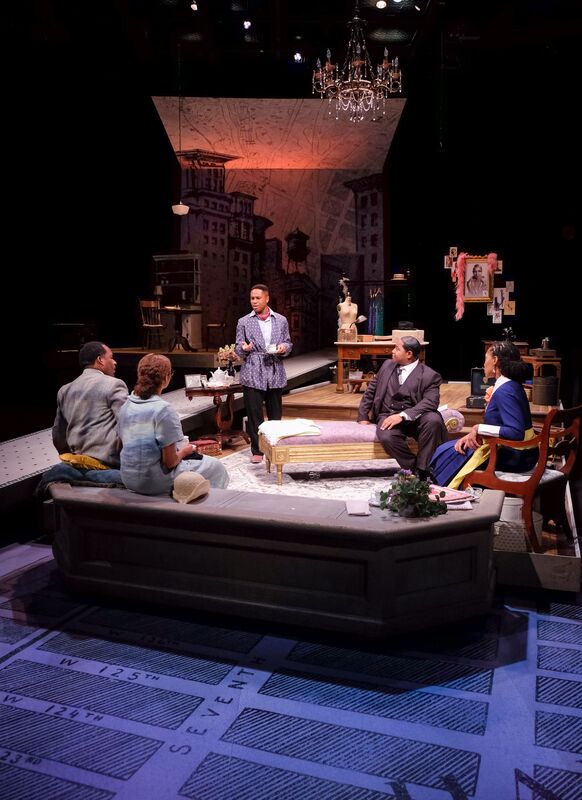|
PlayMakers presents Blues for an Alabama Sky by Pearl Cleage, directed by Valerie Curtis-Newton. Photo of Andre G. Brown, Saleema Sharpe, Jamar Jones, Heinley Gaspard, and Tia James by Huth Photo. These days, slice-of-life plays are becoming fewer and further between. Fortunately, PlayMakers Repertory Company either didn’t get the memo or chose to eschew it in favor of Pearl Cleage’s beautifully-written, poignant Blues for an Alabama Sky, onstage now under the direction of Valerie Curtis-Newton. This play is, indeed, a slice-of-life show, but it’s not a slice of life you get to see very often. Set in the summer of 1930 in Harlem, it centers around a group of friends, all doing their best to make a place for themselves in their ever-changing, tumultuous world.
At the heart of the show is Angel, powerfully acted by Tia James. She’s a dreamer in her own right, but one who has been hardened, at least somewhat, by the uncompromising, male-driven world around her. Fortunately, she’s got cheerful Guy, joyfully portrayed by Jamar Jones, as her bestie and support system. They’re also friends with straightforward, practical Delia (Saleemah Sharpe), who is doing her part to fight for women’s reproductive rights, and smart, skilled bachelor/doctor Sam (Andre G. Brown). Together, this foursome seems ready to take on the world and anything it throws at them, but then Leland Cunningham (Heinley Gaspard) enters the picture. He falls hopelessly in love with Angel, or at least his version of Angel, at first sight. Unfortunately, however, his old-school views and ways don’t quite mesh with this broader-minded group, which results in some surprising twists and turns. The story that unfolds is a somber one in many ways. But, there’s also plenty of light within the script. The relationships that exist among the core friend group ring true. In fact, that’s part of the story’s charm. While it may be set in the past, the relationships are real, vibrant, and often deeply touching. Furthermore, the script stands out for centering around a minority group without making their race the sole focus. Yes, the characters’ Blackness is a central part of the story. Yes, it influences them, their choices, and the freedom they have or don’t have to fully make those choices, but these characters are also allowed to simply exist, to live their lives as fully-realized characters. None of this is to say that this type of storytelling doesn’t exist in modern theatre, but shows that do it as well as this one don’t see the light of the stage frequently enough, though it appears PRC is working hard to change that, as it should. As the characters chase seemingly impossible dreams and grapple with tough questions about where their loyalties truly lie, viewers will find that, regardless of time and place, there is much to identify with in this script. It is, above all, a story about humanity, about processing change, and the struggle to find belonging, themes anyone can relate to. Additionally, Cleage’s sensitive script does not paint any one character as a villain. Instead, it wisely posits the question of whether selfishness can truly exist without comeasurable knowledge and position. While the dense, deep story demands viewers’ full attention, there is also much visual appeal to appreciate. Melanie Burgess has crafted period-perfect costumes that run the gamut from sultry beaded sheaths to sensible suits and hats. Likewise, Matthew Smucker’s open set is alludingly dollhouse-like in its design. Audience members see everything, all at once, making them feel as if they have some control over where these characters’ lives go . . . only to have them discover that they don’t, not at all, as the story draws to a surprising end. Ultimately, this is a haunting production that will stay with viewers for a long time. It is also exactly the type of theatre that the Triangle needs more of.
0 Comments
Leave a Reply. |
TAR
We love the arts. We write about them. Founded 2018. Categories
All
Archives
January 2024
|


 RSS Feed
RSS Feed